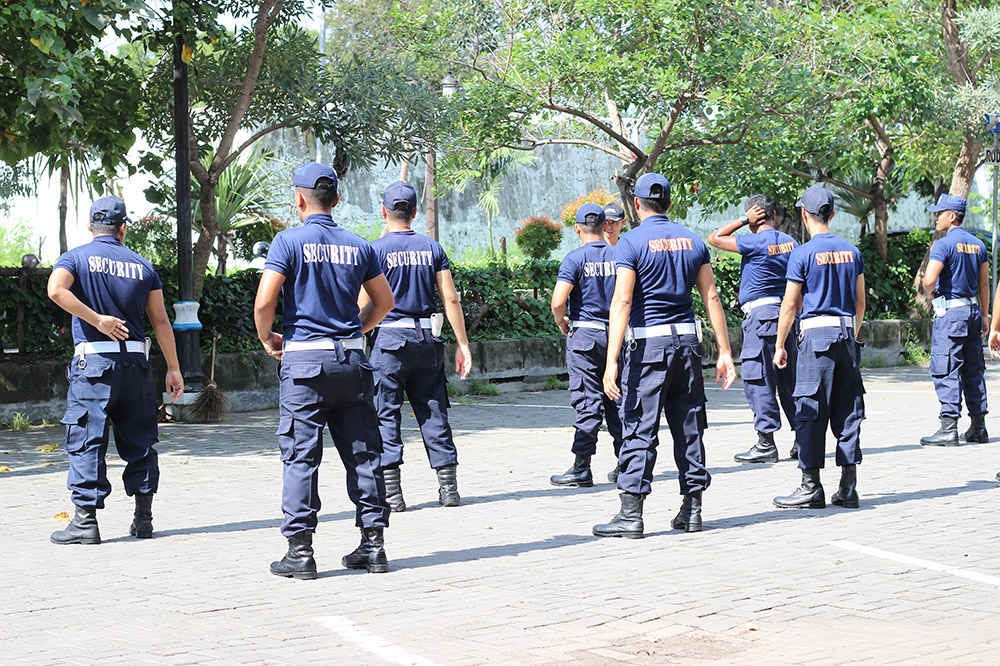Lessons for financial institutions’ human rights due diligence in the private security sector
Private security companies often operate in high-risk areas. This involves major human rights risks, which are often overlooked in screenings and risk analyses. During a webinar, organized recently by PAX and Achmea Investment Management together with the international RBC Agreement for Pension Funds, experts gave information and recommendations on how pension funds can identify, prevent and mitigate risks in the private security sector. The recording of the webinar, recommendations and useful documents are now available.
 © Shutterstock
© Shutterstock
The private security industry is booming. Private security companies supply services to companies in a wide range of sectors, but the sector itself remains associated with a lack of regulation, a lack of transparency and, in turn, a high risk of human rights abuses occurring. Especially in complex environments, like conflict-affected areas, there are many examples of private security services -and consequently the companies hiring them- becoming involved with human rights violations or the aggravation of violent conflicts. In short, definitely a sector to take due notice of in (enhanced) human rights due diligence.
Recommendations
Recommendations to investors and companies linked to private security providers include:
- conduct enhanced human rights due diligence in high-risk sectors and high-risk and conflict-affected areas, including reactive as well as pro-active engagement;
- ask questions on certification and due diligence practices to investee companies contracting private security providers, especially those in high-risk sectors and/or with operations in high-risk countries or regions;
- download ICoCA’s Procurement Guide for Contracting Responsible Private Security Providers;
- encourage any company contracting private security to incorporate ICoCA Membership requirements into their tenders;especially in conflict-affected and high-risk areas, require investee companies contracting private security providers to:
o fully disclose any contracts between the company and public security actors and ensure that these contracts foresee in full liability on the side of the company in case of human rights violations.
o ensure that private security providers in their supply chain are trained in the principles of the democratic rule of law, the right to protest and respect for civic space.
o ensure that in contracts with private security providers clauses are included that forbid the sharing of intelligence/information about civil society and local community leaders between these providers and public security actors, as this might provoke serious human rights violations.
Recommendations to ESG data providers include:
- include ICoCA Membership as a criterion in the ESG methodology for the assessment of private security sector companies;
- include responsible private security in the ESG methodologies for sectors that contract private security companies;
- provide adequate disclaimers to users of ESG ratings about the inability to conduct public domain research in countries with restricted civic space and/or conflict affected areas.
Speakers
Chris Galvin, Head of Communications & Outreach at the International Code of Conduct Association for Private Security Providers (ICoCA) started off with an introduction of the private security landscape and the human rights risks the sector associated with the sector. He also explained about the Code and the certification mechanism, and what ICoCA does to raise standards in the sector.
Download presentation
Joris van de Sandt, Project Lead Latin America at PAX , illustrated the human rights risks of private security provision linked to the extractive industries with examples from conflict-affected areas in Colombia and the DR Congo. He specifically highlighted (the risks rising from) the often opaque relationships and classified collaboration agreements between various security actors in these kinds of setting (security department of the company, private security actors and public security forces).
Download presentation
Frank Wagemans, Senior Engagement Specialist at Achmea Investment Management, explained how investors should conduct ‘enhanced’ human rights due diligence with regards to this sector, focusing especially on pro-active engagement strategies.
Download presentation
Ruben Zandvliet, Business & Human Rights Advisor at ABN AMRO explained how ABN AMRO has integrated specific clauses on private security provision in its sustainability policy and exclusion list.
Further reading
- the Thematic Framework on Investing in Conflict- and Post-Conflict Areas published in the Dutch RBC Agreement for Pension Funds.
- ICoCa’s Procurement Guide to Contracting Responsible Private Security Providers.
- relevant to the private security sector is this tool for investors on human rights risks in the Border and Surveillance Industries.
